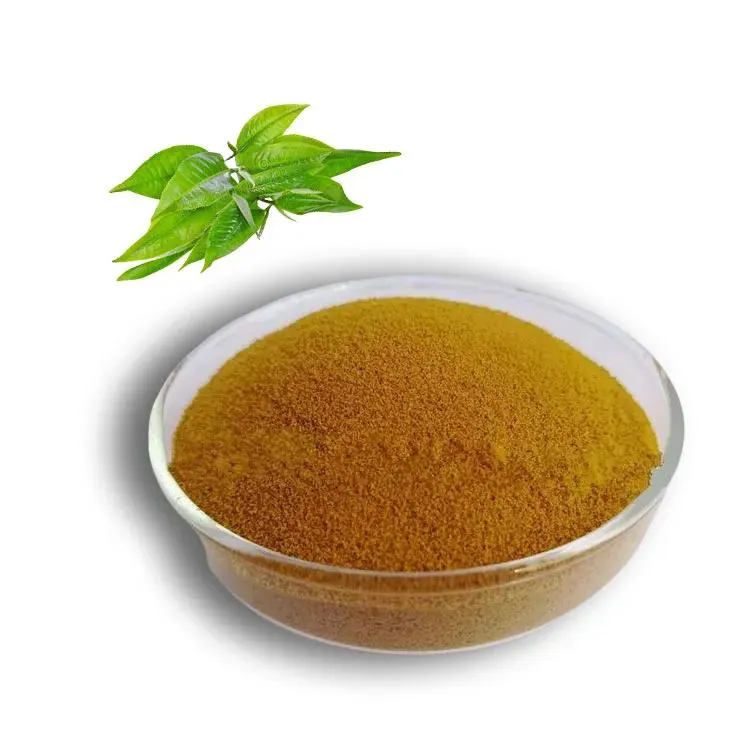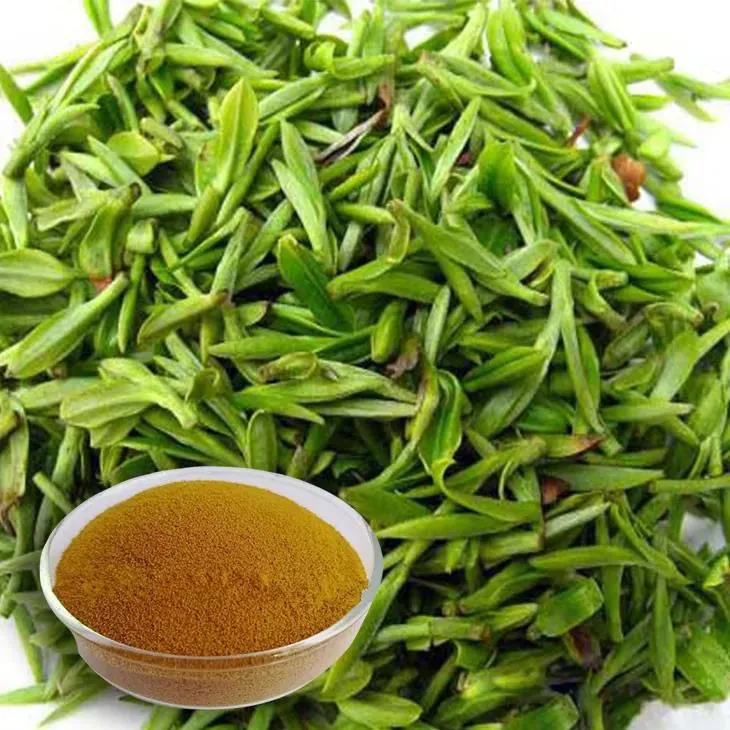- 0086-571-85302990
- sales@greenskybio.com
Benefits of Green Tea Extract: An Impressive Extract on the Kitchen Table.
2024-11-11

Introduction
Green Tea Extract has emerged as a remarkable addition to the items found on kitchen tables around the world. Its popularity has been on the rise, not just for its pleasant taste when added to various recipes or beverages, but more importantly, for the numerous health benefits it offers. This extract is derived from green tea leaves, which have been used in traditional medicine for centuries in many Asian cultures. In modern times, scientific research has been able to uncover and validate many of these purported benefits, making Green Tea Extract a subject of great interest in the fields of health and nutrition.

Anti - Inflammatory Properties
One of the most significant benefits of Green Tea Extract is its anti - inflammatory properties. Inflammation is a natural response of the body's immune system to injury or infection. However, chronic inflammation can lead to a host of health problems, including autoimmune diseases, heart disease, and certain types of cancer.
Green tea extract contains compounds such as catechins, which are powerful antioxidants. These catechins, particularly epigallocatechin - 3 - gallate (EGCG), have been shown to modulate the body's inflammatory response. In the case of arthritis, which is characterized by joint inflammation, green tea extract may offer relief. Studies have indicated that the anti - inflammatory action of green tea extract can help reduce swelling, pain, and stiffness in the joints. This makes it a potentially valuable supplement for those suffering from rheumatoid arthritis or osteoarthritis.
Moreover, the anti - inflammatory effects of green tea extract are not limited to joint problems. It can also play a role in reducing inflammation in the digestive tract. Inflammatory bowel diseases such as Crohn's disease and ulcerative colitis are associated with chronic inflammation in the gut. By reducing this inflammation, green tea extract may contribute to improving the overall health of the digestive system and alleviating symptoms associated with these conditions.

Benefits for Digestion
Green tea extract can have a positive impact on the digestive system. It has the ability to enhance the function of the digestive organs and improve the overall digestive process.
Improved Nutrient Absorption
One of the ways in which green tea extract aids digestion is by promoting better nutrient absorption. The compounds in green tea extract can help the body break down food more efficiently, allowing for greater absorption of essential nutrients such as vitamins, minerals, and amino acids. For example, it can enhance the absorption of iron from plant - based sources, which is often less bioavailable compared to iron from animal products. This is particularly beneficial for vegetarians and vegans who may be at risk of iron deficiency.
Digestive Enzyme Regulation
Green tea extract also plays a role in regulating digestive enzymes. These enzymes are crucial for the breakdown of food in the stomach and intestines. By modulating the activity of digestive enzymes, green tea extract can ensure that the digestive process runs smoothly. It can help prevent issues such as indigestion, bloating, and abdominal discomfort. Additionally, it may support the growth of beneficial gut bacteria, which are essential for a healthy digestive system. A balanced gut microbiota is associated with better digestion, improved immune function, and even mental health.

Oral Health Benefits
Another area where green tea extract shows great promise is in oral health. Maintaining good oral hygiene is essential for overall health, as problems in the mouth can have far - reaching consequences.
Antibacterial Action
Green tea extract contains antibacterial agents that can combat bacteria in the mouth. Oral bacteria are responsible for a variety of dental problems, including cavities and gum diseases. By inhibiting the growth of these bacteria, green tea extract can help reduce the risk of developing cavities. Research has shown that regular use of green tea extract - containing products, such as mouthwashes or toothpaste, can lead to a significant decrease in the number of harmful bacteria in the mouth. This, in turn, can contribute to better oral health and a lower incidence of dental caries.
Gum Health
In addition to preventing cavities, green tea extract is also beneficial for gum health. Gum diseases, such as gingivitis and periodontitis, are common oral health problems that can lead to tooth loss if left untreated. The anti - inflammatory and antibacterial properties of green tea extract can help reduce inflammation in the gums and prevent the progression of gum diseases. It can also promote the healing of gum tissue in cases where there is already some damage. For example, if a person has bleeding gums due to gingivitis, using green tea extract - based products may help improve the condition over time.
Other Potential Benefits
Beyond the well - known benefits related to inflammation, digestion, and oral health, green tea extract may offer several other advantages.
Weight Management
Green tea extract has been associated with weight management. Some studies suggest that it can boost metabolism, which is the process by which the body converts food into energy. A faster metabolism means that the body burns more calories at rest. Additionally, green tea extract may help reduce appetite, making it easier for individuals to control their food intake. However, it should be noted that while green tea extract can be a useful addition to a weight - loss plan, it is not a substitute for a healthy diet and regular exercise.
Heart Health
There is evidence to suggest that green tea extract may contribute to heart health. The antioxidants in green tea extract can help prevent the oxidation of LDL cholesterol, which is often referred to as "bad" cholesterol. Oxidized LDL cholesterol can build up in the arteries, leading to atherosclerosis, a condition that increases the risk of heart attacks and strokes. By reducing the oxidation of LDL cholesterol, green tea extract may help keep the arteries clean and reduce the risk of cardiovascular diseases. Moreover, it may also have a positive effect on blood pressure, helping to keep it within a healthy range.
Skin Health
The antioxidant properties of green tea extract also extend to skin health. Free radicals in the environment can damage skin cells, leading to premature aging, wrinkles, and other skin problems. By neutralizing these free radicals, green tea extract can help protect the skin from damage. It may also have anti - inflammatory effects on the skin, which can be beneficial for conditions such as acne, eczema, and psoriasis. Some skincare products now contain green tea extract as an ingredient, taking advantage of its skin - protecting and rejuvenating properties.
How to Incorporate Green Tea Extract into Your Diet
There are several ways to include green tea extract in your daily diet.
- Green Tea Beverages: The simplest way is to drink green tea. You can choose from a variety of green tea types, such as matcha, sencha, or jasmine green tea. These teas can be prepared hot or cold, depending on your preference. If you prefer a more concentrated form of green tea, you can make a strong brew and drink it throughout the day.
- Supplements: Green tea extract is also available in supplement form, such as capsules or tablets. These supplements are convenient for those who may not like the taste of green tea or who want to ensure a consistent intake of the extract. However, it is important to follow the recommended dosage instructions when taking supplements, as excessive intake may have potential side effects.
- Food Additive: Green tea extract can be added to various foods. For example, it can be used in baking to add a unique flavor to cakes, cookies, or muffins. It can also be added to smoothies, yogurt, or oatmeal for an extra nutritional boost.
Precautions and Side Effects
While green tea extract offers many potential benefits, it is important to be aware of some precautions and possible side effects.
- Caffeine Content: Green tea contains caffeine, and green tea extract may have a concentrated amount of caffeine. Excessive caffeine intake can lead to side effects such as jitters, insomnia, and increased heart rate. People who are sensitive to caffeine should be cautious when using green tea extract.
- Interactions with Medications: Green tea extract may interact with certain medications. For example, it can interfere with the effectiveness of blood - thinning medications, such as warfarin. If you are taking any medications, it is advisable to consult your doctor before starting to use green tea extract.
- Allergic Reactions: Although rare, some people may be allergic to green tea extract. Symptoms of an allergic reaction may include rash, itching, swelling, or difficulty breathing. If you experience any of these symptoms after using green tea extract, discontinue use immediately and seek medical attention.
Conclusion
Green tea extract is truly an impressive addition to the kitchen table. Its diverse range of benefits, from anti - inflammatory effects to improvements in digestion, oral health, and potential advantages in other areas such as weight management, heart health, and skin health, make it a valuable substance. However, like any supplement or food ingredient, it should be used with caution, taking into account individual health conditions, medications, and potential sensitivities. By incorporating green tea extract into our diets in a safe and appropriate way, we can potentially reap the many benefits it has to offer and enhance our overall well - being.
FAQ:
What are the anti - inflammatory benefits of green tea extract?
Green tea extract has anti - inflammatory properties. For people with inflammatory conditions like arthritis, it can potentially reduce inflammation and ease related symptoms.
How does green tea extract improve digestion?
It improves the function of the digestive system. It promotes better absorption of nutrients, which is crucial for overall digestive health.
Can green tea extract really help with oral health?
Yes, it can. Green tea extract may help fight against bacteria in the mouth. By doing so, it can reduce the risk of cavities and gum diseases.
Are there any other health benefits of green tea extract?
Besides anti - inflammatory, digestive and oral health benefits, green tea extract may also have antioxidant properties, which can help protect cells from damage, and it may also play a role in weight management, though more research is needed in some of these areas.
How can one incorporate green tea extract into their daily diet?
One can take green tea extract in supplement form. Also, drinking green tea, which contains the extract, is a common way. Some people may also use it in cooking or baking, although this is less common.
Related literature
- The Health Benefits of Green Tea Extract: A Review"
- "Green Tea Extract and Its Impact on Human Health"
- "Antioxidant and Anti - inflammatory Properties of Green Tea Extract"
- ▶ Hesperidin
- ▶ Citrus Bioflavonoids
- ▶ Plant Extract
- ▶ lycopene
- ▶ Diosmin
- ▶ Grape seed extract
- ▶ Sea buckthorn Juice Powder
- ▶ Fruit Juice Powder
- ▶ Hops Extract
- ▶ Artichoke Extract
- ▶ Mushroom extract
- ▶ Astaxanthin
- ▶ Green Tea Extract
- ▶ Curcumin
- ▶ Horse Chestnut Extract
- ▶ Other Product
- ▶ Boswellia Serrata Extract
- ▶ Resveratrol
- ▶ Marigold Extract
- ▶ Grape Leaf Extract
- ▶ New Product
- ▶ Aminolevulinic acid
- ▶ Cranberry Extract
- ▶ Red Yeast Rice
- ▶ Red Wine Extract
-
Calendula Extract
2024-11-11
-
Rosemary extract
2024-11-11
-
Moringa powder
2024-11-11
-
Baicalin
2024-11-11
-
Eyebright Extract
2024-11-11
-
Agaricus Blazei Extract
2024-11-11
-
Sea buckthorn oil
2024-11-11
-
Pomegranate Extract
2024-11-11
-
Hawthorn Extract
2024-11-11
-
Natural grape seed extract
2024-11-11





















